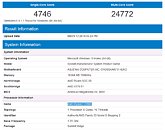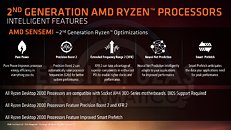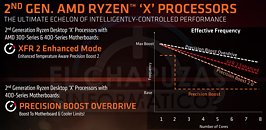Wednesday, March 14th 2018

AMD Ryzen 7 2700X Rears Its Head On Geekbench
As we grow ever closer to the launch of AMD's 2000-series, details and scores are expected to be revealed in increasingly faster fashion. Today, some Geekbench benchmarks (reportedly) of an AMD 2700X CPU have appeared, shedding some light on the expected performance - and performance improvement - of the new AMD top-of-the-line CPU.
The Ryzen 7 2700X CPU that has been tested achieved scores of 4746 single core and 24772 multi-core, which show some interesting improvements over the original flagship Ryzen 7 1800X. The official Geekbench baseline scores for AMD's 1800X are 4249 and 21978, respectively, for single and multicore benchmarks. This means that the new 2700X, which is expected to carry an increased 100 MHz base (3.7 GHz vs 3.6 GHz) and 350 MHz higher boost (4.35 GHz vs 4.0 GHz) over the 1800X, is pulling some additional performance from some micro-architecture refinements, and not just from the added clockspeed. The mobo used, an ASUS ROG Crosshair VI Hero motherboard, is a X370-series chipset motherboard, so while it supports the new AMD CPUs, it might not fully support all their SenseMI Gen 2 improvements. From what can be gleaned, the Ryzen 7 2700X ran at its default base frequency of 3.7GHz, and the accompanying 16GB memory ran at 2.4GHz.
Source:
Hexus.net
The Ryzen 7 2700X CPU that has been tested achieved scores of 4746 single core and 24772 multi-core, which show some interesting improvements over the original flagship Ryzen 7 1800X. The official Geekbench baseline scores for AMD's 1800X are 4249 and 21978, respectively, for single and multicore benchmarks. This means that the new 2700X, which is expected to carry an increased 100 MHz base (3.7 GHz vs 3.6 GHz) and 350 MHz higher boost (4.35 GHz vs 4.0 GHz) over the 1800X, is pulling some additional performance from some micro-architecture refinements, and not just from the added clockspeed. The mobo used, an ASUS ROG Crosshair VI Hero motherboard, is a X370-series chipset motherboard, so while it supports the new AMD CPUs, it might not fully support all their SenseMI Gen 2 improvements. From what can be gleaned, the Ryzen 7 2700X ran at its default base frequency of 3.7GHz, and the accompanying 16GB memory ran at 2.4GHz.



70 Comments on AMD Ryzen 7 2700X Rears Its Head On Geekbench
CPU 50% GPU 88%. Does this mean the Ryzen's slow or the game is not using the resources? Similar situation happens in the 720p. The GPU so as the CPU are not being utilized fully. If we conclude that the GPU must stay at a 100% for the best FPS the CPU must use as many resources to feed the GPU which isn't happening in some games.
I don't think that the 720p res is a good indictor. Especially if we see games that gain no FPS difference or marginal difference in FPS moving from 720p to 1080p despite of the CPU brand
You call it single core performance issue and I call it games lack the ability to distribute task with given resources. I look at this issue from a different angle but you can blame whatever or whoever you want.
Edit:
Typical game have large parts of code that can't be calculated simultaneously, for example because further calculations depends on the result of previous.
Amdahl's law explains that
As for the 720p testing discussion... I'm not getting into that one again, it means immovable objects meeting unstoppable forces @EarthDog :D but I will say that I still firmly believe it to be an informative and useful test to gauge relative CPU performance.
Regardless, the idea of games ever becoming completely multithreaded is probably never going to become a reality because gaming is 'sequential' of nature. If this, then that, and 'this' is entirely up to player input thus hard to 'predict', and predicting all possible outcomes is often much more costly than just 'doing it'.
Taking into account the same case, power supply, RAM, video card, CPU cooler, and SSD the AMD system with a R5 1600 is priced at $1145.92 before tax and an equivalent Intel-based system with an 8700K is priced at $1295.92 before tax. The difference is just $150. So the question is, when I take this into account what kind of system do I want to buy? Intel or AMD?
Come the end of April I'll have the money saved up to build the system that I want to build. What processor that system will have is still very much up in the air. Do I go with the tried and true Intel solution (8700K) or go with AMD? That I have no idea. I'm looking forward to the Ryzen 2000-Series (not Zen 2) benchmarks, maybe that will make up my mind.
browser.geekbench.com/v4/cpu/compare/7494872?baseline=7504447
NOTICE the board used: could it have a negative impact on the performance?
Wondering why those benchmarks are on paper in a book?
Compared to my personal R7 1700@stock with 2933cl14 memory.
valid.x86.fr/8f6fru